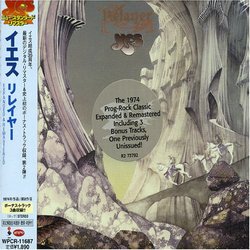| All Artists: Yes Title: Relayer Members Wishing: 2 Total Copies: 0 Label: Wea/Warner Original Release Date: 1/1/2003 Re-Release Date: 9/22/2003 Album Type: Import, Original recording remastered Genres: Pop, Rock, Classic Rock Styles: Progressive, Progressive Rock, Album-Oriented Rock (AOR) Number of Discs: 1 SwapaCD Credits: 1 |
Search - Yes :: Relayer
 | Yes Relayer Genres: Pop, Rock, Classic Rock
Digitally remastered Japanese version. |
Larger Image |
CD DetailsSynopsis
Album Description Digitally remastered Japanese version. Similar CDs
|
CD ReviewsRelayer--somewhere in between greatness and insanity Squonk | The dark forests of Pennsylvania, where hunters fo | 10/18/2006 (4 out of 5 stars) "Following on the heels of an album many attribute to the collapse of progressive rock ('Tales from Topographic Oceans' in 1973), Yes sought to heal the gap it had driven between its fans--some loved 'Tales,' and others thought it was bombastic and (a classic pun) over the edge. Critics saw 'Tales' as an opportunity to do something they had been waiting to do forever: demonstrate to the mere common man their birthright superiority by collectively dashing the whole of progressive rock into oblivion. They successfully destroyed the further exploration and cultivation of the art form, but not the spirit of its followers. It was in this climate, though, that Yes's 1974 release, 'Relayer,' was somewhat ignored and shunned. The band did not succeed outright in reuniting its fans (three years later, the release of 'Going for the One' came much closer to this ideal) with 'Relayer,' but they did set down a truly progressive album, ripe with fresh ideas and a totally new direction for the band. This new direction was fostered somewhat by the recent lineup changes (the exodus of drummer Bill Bruford after 'Close to the Edge' and keyboardist Rick Wakeman's departure after 'Tales'). Drummer Alan White was called in for 'Tales,' and to fill Wakeman's shoes, Swiss-born keyboardist Patrick Moraz was commissioned well into the 'Relayer' project. White, now a seasoned member of the band, gained the confidence to give his best performance on 'Relayer.' And Moraz, a fresh addition, offered a completely different playing style than Wakeman. While Wakeman was steeped in classical, Moraz was much more influenced by jazz. Now that I have given the facts, it's time for the evaluation segment. I must respectfully disagree with many of the reviewers of this album in that I personally do not like Patrick Moraz's work. Considering the matter at length, I find the parts about the album I consistently dislike are the keyboard lines. The synthesizer programming is universally awful; most of the time it sounds like helium escaping from a balloon. Also, Moraz uses almost all synthesizers, the Mellotron is often swallowed in the mix, and the Hammond organ is almost nonexistent. The latter two are things I miss from the band's earlier albums; even Tony Kaye on the very early albums was proficient in the usage of the Hammond organ. The Hammond, I believe, was integral to the band's sound. And Rick Wakeman's classical sensibilities kept his contributions within the bounds of reason, whereas Moraz's work is rather grating and irritating. Finally, Wakeman's synthesizer programming--though sometimes staid--had a warm and organic feel to it, something which I sorely miss on 'Relayer.' While it is true that this album is indeed one of noticibly less absolute structure than the previous efforts, and while certainly its sound is rougher and harder, I think some sort of solid base was needed, and the keyboards would have been where I would have placed it. As far as Alan White, I agree with most people (including Bill Bruford himself): He just doesn't quite measure up to Bruford, though he is very good. Of course some of that may well be the somewhat flat production of this album (which was recorded in some sort of mobile studio), but it seems as though the life and breath the drumming had when Bruford was at the sticks has vanished in favor of a more "backseat" style of drumming. The remarkable thing about Yes is that, on the three albums from 1971 ('The Yes Album') to 1972 ('Fragile' and 'Close to the Edge'), no member of the band ever served simply as background. Most bands subjugate the rhythm section to a mere continuo, but not Yes. Each member of the band stood out at some point or other in the music. White, for all his efforts, sort of fades into the background in a way that Bill Bruford never did. The remaining members of the band perform brilliantly as ever. Jon Anderson's vocals are truly first-rate, Steve Howe gives what is perhaps his most daring technical performance all throughout the album, and Chris Squire's trademark Rickenbacker--muted a little in this album--is present as ever. Overall the musicianship of the band is sterling, perhaps better than at any point or lineup in the band's existence. I will never dispute that 'Relayer' is the most technically-advanced Yes album, and I will venture to argue that it is the most technically-advanced album in all of music. But technical skill, dazzling as it may be, is not everything in music. As far as the album itself, I wouldn't proclaim as some have that it is Yes's greatest achievement. On the whole, it's somewhat less musical than most Yes music and a great deal denser and harder to appreciate. It's also somewhat darker lyrically than the generally sunny material put out by the band in the past. The first track is by far the best, and the next two just don't strike me as anywhere near as brilliant as some people find them. In fact, I find the second track nearly unlistenable, especially the frenzied "Cha cha cha!" part near the end. It is for the comparatively lacking status of these two tracks, along with the awful keyboards, that I only give the release four stars. There is brilliant material on 'Relayer,' but I believe some of it could have been presented and developed much better. For the most part, the entire album is a clear departure from the earlier releases. It does not entirely lack structure as some people might at first believe; rather, the structure of each track is held together much more loosely then in the conventional sense and mostly by the format of the song, not the actual music itself. This will take some acclimation, and all through this album one perceives the opposing forces of greatness and insanity battling it out, each with the ultimate goal of prevailing. Throughout, a tenuous balance between the two is upheld. I will now comment exclusively upon the first track, "The Gates of Delirium." This song will take a great deal of listening in order to appreciate. Most people who first listen to it will find themselves wishing it to be over around about the ten-minute mark. Of all the Yes I have sampled (everything from the debut up through this album, and then some of their later material), "Gates" by far took me the longest time to like. And, unlike any other Yes song I have ever heard, I utterly hated "Gates" the first three or four times I tried it. It is the wildest, most cacophonic piece of music ever recorded, I venture to say. So why did I keep listening to it? Well, I did spend a decent amount of money on the album, and if I had just left it on the rack collecting dust, all I would have had to show for it would have been perhaps one of the prettiest album covers Roger Dean ever produced. Also, I refused to believe something that appealed so little to me could possibly have generated so much acclaim among progressive rock fans. Obviously the music was very difficult to get into, and I decided to confront the challenge with repeated listening. I won, so to speak, because I have discovered the magic of this track. The comparison that is made most often is between "The Gates of Delirium" and "Close to the Edge." My opinion on the matter has changed with repeated listening to both, and I must now submit that I honestly cannot decide which of these phenominal epics is better. I suppose it depends upon the day on which you ask the question, so for all practical purposes, to me it's a tie. "Gates" carries the listener through one of the most engrossing musical journeys ever composed. The basic story is that of a war, and then the silence which follows the fighting. The story is told through both the words and the music, which is a trademark facet of Yes music since 'Close to the Edge.' The ending sequence, excised as the single "Soon," is breathtakingly beautiful. It only really shines with all its might when absorbed just after the brain-shattering cacophony of the "War of the Instrumentalists" that comes just before it in the music. After that intensity, one feels as though he had actually been part of the battle, and now that it's over, the sun is shining down in vivid shafts through the clouds. And, up in the sky, the gates of Heaven are opening and spreading eternal warmth and beauty over the war-torn landscape. The delirium of war is replaced with the glimmering, soul-fulfilling advent of inner peace. It will give you chills. All in all, this album is experiencing a revival insofar as appreciation. And I believe it deserves it; it was underrated in the beginning, and it is now finally seeing its due. However, I would recommend 'Relayer' to only a very select group of people. Devoted Yes fans (or is it Yesfans) probably already have this album in one form or another, and if not, what are you waiting for? I would definitely not start with 'Relayer' if you are new to the band or to progressive rock in general. 'The Yes Album' (1971), 'Fragile' (1972), and 'Close to the Edge' (1972) (and in that order) would be your best bet. If you like what you hear, you will (eventually) like 'Relayer.' Basically, this is a fans' album. Casual listeners probably shouldn't waste their time on this one. I'm not trying to be condescending; I'm just trying to save you some time and money." Excellent Yes CD - BUT BEWARE IF YOU ARE THINKING YOU ARE OR Tallyfish | Tallahassee, Florida USA | 12/26/2008 (4 out of 5 stars) "My review is not to critique this particular Yes CD. It's an excellent choice. HOWEVER, I purchased this particular item on this page thinking I was buying the Japanese remastered edition, as the Amazon description says. There is a Japanese Remastered edition, HDCD by the way. That was the one I thought I had found. Upon receiving, it is the AMERICAN Remastered CD with a Japanese obi strip and addtional plastic folder enwrapping it. So if you are looking for the Japanese Remastered edition, look elsewhere. Amazon needs to make a correction or clarification here. Even the Amazon Japan site, which I looked at after I received the disc, says this is the American version."
|

 Track Listings (3) - Disc #1
Track Listings (3) - Disc #1